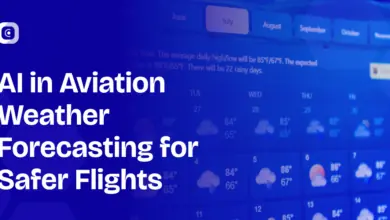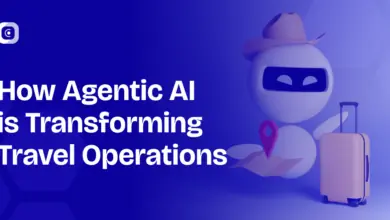AI-Powered Travel Planner: Redefining How We Search for Flights, Hotels, and Packages
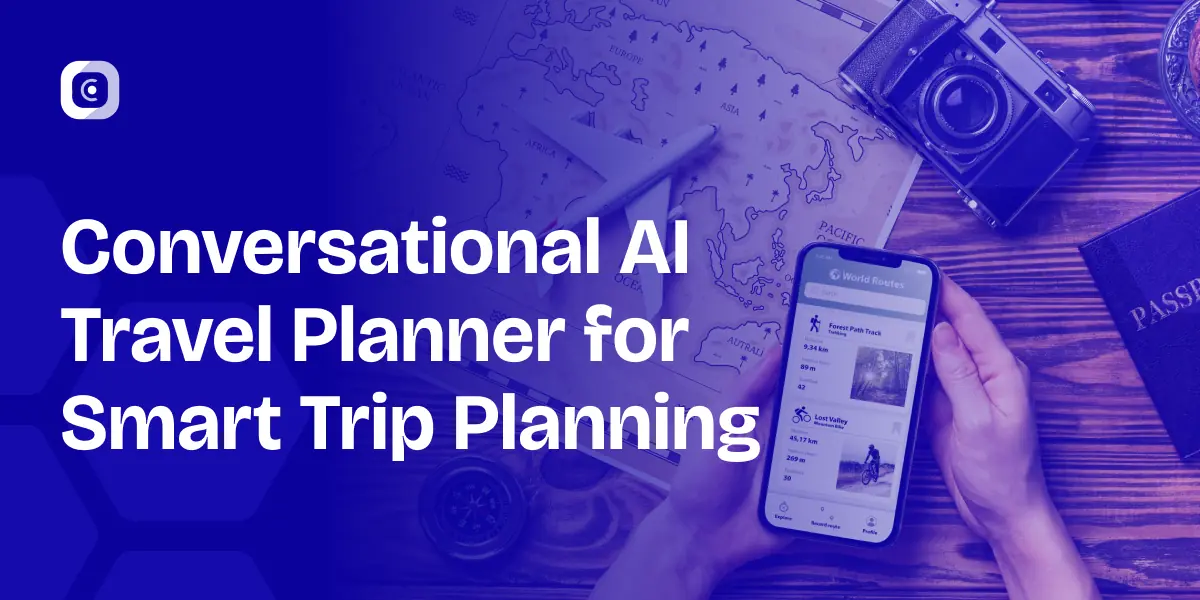
The way we choose travel options is changing. AI travel planners, using conversational AI and large language models, are changing how we book everything, from flights and hotels to all-inclusive travel packages. Scrolling and using filters are things of the past. Now, a traveler just describes their wish in plain language, “a family vacation in Dubai with a 5-star hotel and kid-friendly activities”, and gets an instant, customized answer.
In the era of AI-driven personalization, integrating advanced functions like smart search with the ability to understand users’ needs and give proposals on the spot makes this an unprecedented travel experience. No longer do users have to navigate the complicated world of traditional travel booking systems.
Introduction: Travel Planning Hasn’t Really Changed (Until Now)
For a long time, preparing for a trip meant balancing several browser tabs, looking up flights, reading endless lists of hotels, and applying filters to get results that “almost” matched what we wanted. From booking a flight from Delhi to Dubai or picking a deluxe hotel for a honeymoon, the situation has been the same: search, filter, compare and repeat.
This monotonous task is finally receiving improvements thanks to AI travel planners. Instead of manually filtering hundreds of options, travelers can now use AI trip planners that process natural language. You can say, “Find me a 5-day luxury stay in Dubai with ocean-view rooms and all-inclusive meals,” and the AI suggests curated flights and hotels, packages, and deals in seconds.
The change is not only about ease of use. AI in travel planning has moved beyond mere customer support or basic chatbots. This is the first time we can talk about AI for travel assistance in a meaningful way. AI tools like ChatGPT, Gemini, and Claude have the capability to act seamlessly to provide travel assistance.
This is part of the change in traveler expectations for personalized travel experiences. According to Booking.com’s Global AI Sentiment Report (July 2025), 89% of their audience responded positively to the idea of AI being used for future travel. Traveler reliance on AI for travel planning shows a shift in preference from conventional search to conversational search in travel. This shows a preference for intelligent travel.
What Is an AI Travel Planner?
An AI travel planner is a helpful system powered by large language models (LLMs) and conversational AI that assists customers in trip planning through natural dialogues. Users do not have to fill out complicated search forms or go through countless filters. Users can just tell their requirements in everyday language. Customers can even say it like they are having a discussion with a travel planner.
When you say something like:
“Plan a 3-day weekend getaway from Mumbai to Goa with a beachfront resort under ₹25,000.”
The AI travel planner understands your purpose, identifies the destination, duration, and budget, and recognizes the type of travel. It then retrieves real-time information on flights, hotels, and packages that fit the user’s information.
Traditional travel chatbots are limited to pre-set commands as they are not designed to respond to free-form commands. AI travel assistants understand the context and several command layers. They can understand a command with multiple processing pathways. In the example, the user says, “make it a family friendly resort,” and the AI planner knows to change the suggestions to family friendly without the user having to start the request over.
The unique working of this system is the real-time data personalization, AI contextual search, and data integration. Taking the user from “idea” to “itinerary” in travel planning is possible in this AI travel planner.
Why Traditional Travel Search Feels Outdated
Online travel bookings have adopted an oddly repetitive routine of searching, filtering, comparing, and repeating. Travelers frequently open numerous tabs, type in departure cities and dates, apply budget or rating filters, and then scroll through pages of listings. More often, none of these listings meet their real request. Even with modern interfaces, it still feels more mechanical than intuitive.
The issue lies more in the systems the interfaces use. Traditional booking systems have a structured approach where the user selects from dropdowns, checks boxes, or filters things manually. But, travelers use natural language: “I want to visit a quiet hill station near Delhi for a 3-day weekend in November.” A conventional search engine simply can’t understand intent at this level. They focus more on keywords than the context and forget the user’s emotion and experience of travel planning. The outcomes are frustration, endless re-runs of the same search, and a lack of personalization in what is offered.
Time is another limitation. Research from Expedia and Google Travel suggests that travelers invest more than 10 hours on average in research prior to making a reservation. This emphasizes the amount of time typical search continues to consume.
Traveler expectations are amplifying the need for intelligent, chat-driven, tailored search. Rather than making searchers comply with inflexible search protocols, AI-based travel planners tailor to actual human thought and planning, which is a breakthrough from fixed search to smart exploration.
How AI Is Changing Travel Searches
AI-powered travel planners are a more advanced and user-friendly option for trip planning. Unlike the click and filter approach of traditional planners, LLM powered AI trip planners, like ChatGPT, Gemini, and Claude, process and understand requests in natural language, context, and user preferences.
For instance, you can type,
“Plan a family trip to Bali for 5 days this December with luxury beachside hotels and kid activities.”
In a matter of seconds, the AI travel assistant picks various relevant flight and hotel options and activities, and then parses through all of the relevant data to get to activities that match your intent based on type (family trip), destination (bali), duration (5 days), priorities (luxury), and proximity (beach).
Unlike traditional systems that rely on fixed parameters, AI-driven personalization uses contextual search and real-time data integration. User behavior, weather, flight pricing, and even user sentiment are analyzed to provide insights that far exceed rational expectations.
This is not just a simple AI command response like chatbots; this is Conversational AI in travel which acts as a human assistant by understanding the user-defined goals, preferences, and constraints as a travel planner.
Interactive travel planning uses AI-powered travel booking systems with AI travel search, where queries can be refined with simple instructions such as “make it pet-friendly” or “add adventure activities.”
LLMs analyze and learn from traveler intent data, which allows for increasingly intelligent responses. Real-time accurate data is accessed through API integrations with airlines, hotels, and travel activities.
This gives users effortless discovery with which they can go from inspiration to booking in one seamless interaction. This new era in travel planning is conversational, with AI grasping intent, context, and sentiment to make trip planning a truly conversational experience.
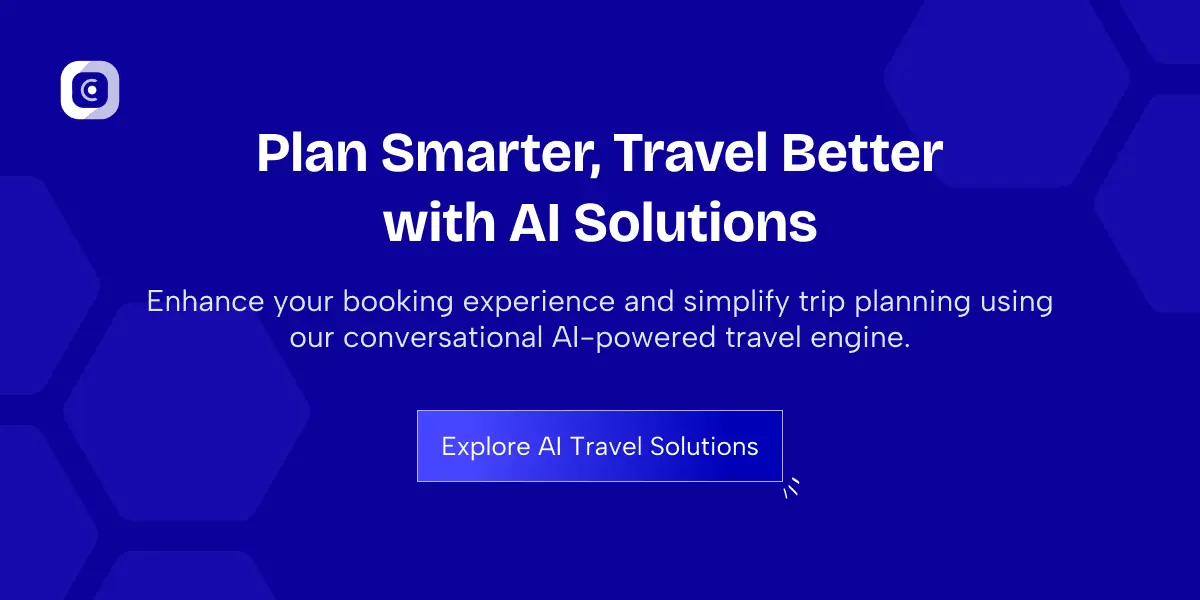
What Makes AI Travel Planners Different from Chatbots
Initially, when people hear “AI in travel” they may visualize primitive chatbots responding with messages such as “Click here to know more.” But modern AI travel planners exceed these simple robotic functions as they become powerful, context-sensitive, and function as true virtual assistants through the integration of conversational AI and large language models (LLM).
Standard chatbots are confined to rigid command sequences. Response frameworks are so fixed that when a user states, “book a flight,” a set range of responses is returned. Consider the example of a user stating “Find me the best 5-day luxury beach stay near Goa with spa and sea-view rooms for under ₹40,000.” A primitive or basic chatbot would become confused.
An AI Travel Planner specifically incorporates travel intent (beach stay), location (Goa), duration (5 days), preferences (luxury, spa, sea view), and budget (₹40,000) to filter down to relevant accommodations . These systems are additionally able to refine search responses based on user input such as “make it couple-friendly”.
Key Differences Between Chatbots and AI Travel Planners
| Characteristic | Traditional Chatbot | AI Travel Planner |
| Response Type | Predefined or static | Contextual and dynamic |
| Understanding | Keyword-based | Intent-based |
| Personalization | Little | Deep and adaptive |
| Interaction Style | One question at a time | Continuous, conversational |
| Capabilities | Limited Q&A | End-to-end planning assistance |
AI travel planners analyze previous interactions. For example, if a customer repeatedly looks for family-focused or adventure hotels, future suggestions will likely predict those preferences. This ability to learn and adapt is what distinguishes them from traditional chatbots; they develop over time with each interaction.
Essentially, chatbots respond to prompts, but AI travel planners create unique experiential offerings. They recommend destinations and empower travelers to make assertive and educated choices, thereby changing a once transactional experience into one that is truly customized.
How an AI Travel Planner Works
AI Travel Planners provide users with an experience comparable to the assistance of a travel consultant. Instead of sorting through multiple web pages with different tabs and filters, a user engages with a contextual assistant that recognizes and prioritizes the user’s preferences in a fast and intuitive manner.
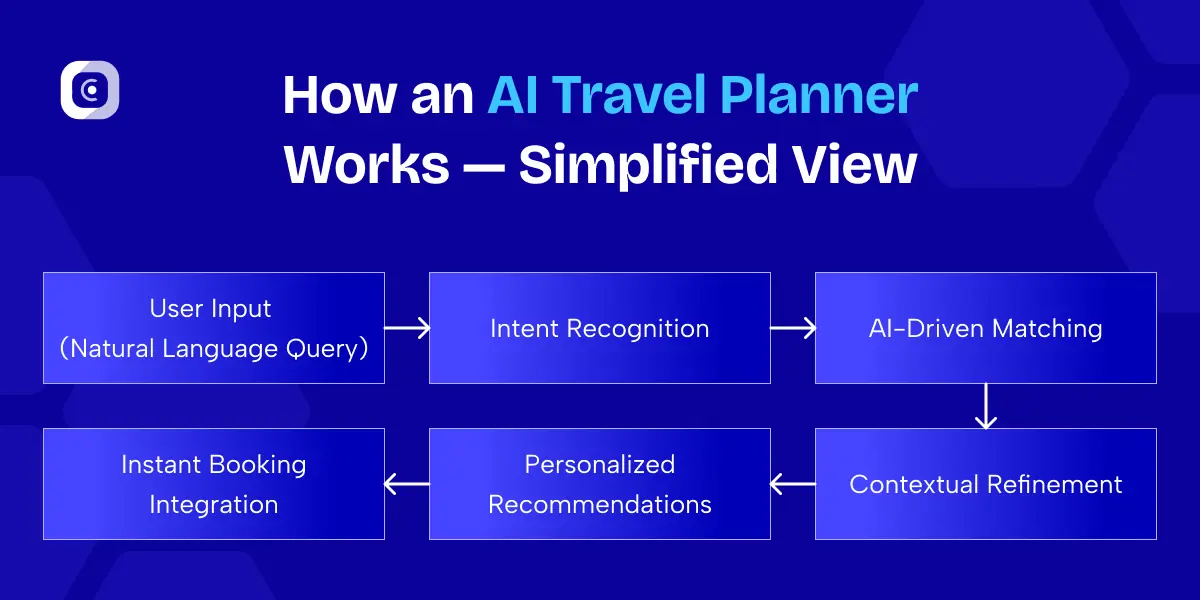
User Input: A user gives a query like, “Find me a beach resort in Thailand under ₹40,000 for 5 days.
Understanding Intent: Travel plan requests are analyzed to understand user intent by flags such as destination, travel budget, trip duration and type of travel.
AI Driven Analysis: AI initiates a comparison of travel requests against real-time offers for flights, hotels, and travel packages sorted by user inputted preferences of travel comfort, budget, family friendliness and sensitivity, and geographic location.
Contextual Refinement: User can continue with AI through conversational prompts like “Make it a couple-friendly resort near nightlife areas”. AI instantly contextualizes the new parameters without requiring a reset.
Personalized Suggestions: The system provides travelers with custom-tailored recommendations for flights, hotels, and activities based on their choices, price sensitivity, and time parameters.
Real-time Booking Capabilities: When travelers are ready to finalize their arrangements, the AI utilizes booking APIs for direct integration cutting the time spent on arrangements from several hours to mere minutes.
The output is a seamless travel planning experience that feels intuitive, fast, and highly personalized.
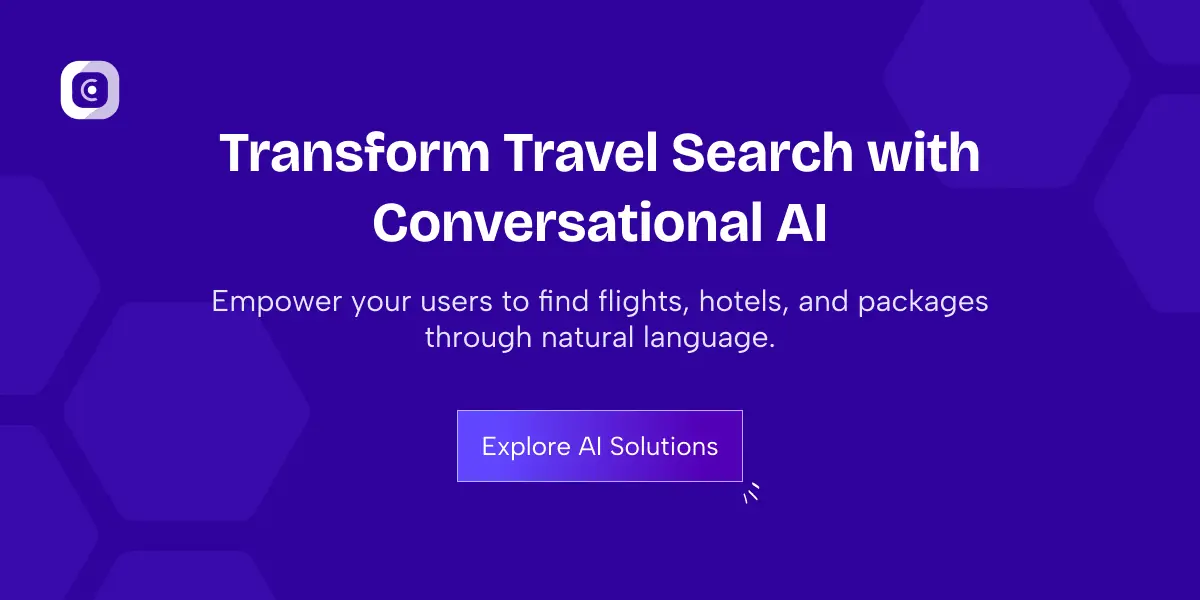
Technologies Behind AI Travel Planners
Travel planning systems appear straightforward on the user’s end; however, many systems are working together behind the scene smartly, adaptively, and humanly intuitively.
Large Language Models (LLMs)
The systems are powered by tools like ChatGPT, Gemini, or Claude and form the conversational layer. They read the context, infer the goal, and react without effort, transforming a simple textual query into a valuable travel insight.
Natural Language Processing (NLP)
NLP assists the AI in interpreting human communication by disaggregating clauses to recognize the location, time, budget, and sentiments. It determines if the user requests a “calm” holiday or if they seek an “exciting” trip.
Machine Learning for Personalization
Machine Learning algorithms monitor and collect user travel history and preferences, modifying recommendations based on what they’ve chosen and their feedback.
Real-Time Data APIs
The integration of global flight, lodging, and weather APIs allows the AI to present the current pricing, travel availability, and conditions.
Conversational Interface
The chat system interface is engaging and user friendly, allowing travelers to elaborate on and adjust their travel plans in real time without the need to go through classic search filters.
AI Analytics and Insights
AI continuously tracks patterns and behavioral economics to refine predictive recommendations, ensuring a seamless feedback loop and ongoing optimization.
When combined, these technologies constitute the foundation of automated, individualized travel assistants, leveraging intelligent automation and redefining trip planning for the contemporary traveler.
Key Features of an AI Travel Planner
Today’s AI travel planners extend functionalities far beyond traditional search options. They incorporate conversational abilities, contextual situation awareness and real time intelligence, revolutionizing travel exploration and making it even more effortless and individualized.
Natural Language Search
Users can give commands like “book a beach resort in Thailand for under $800 for next month”, and receive customized results instantaneously, without any tedious drop down menus or filters.
Personalized Recommendations
Systems assess user profiles based on budget, destination, kind of trip, etc. AI captures and automates these preference adjustments during each session to provide better recommendations.
Real Time Updates
Live API integration offers information on changing prices and flight status, eliminating guesswork during the planning and booking stages.
Multi-Platform Assistance
AI travel planners provide assistance on chat, web, mobile. They even store contextual data across platforms and maintain conversational histories.
Seamless Booking
Users book and discover everything in a flow of conversation, without changing apps or tabs.
Predictive Intelligence
AI enhances user satisfaction and increases conversion rates by anticipating user needs, like suggesting travel insurance, visa information, better flight times.
Benefits of AI Travel Planners for Travelers and Businesses
AI travel planners represent more than a technological innovation. They signal a change in how travel is researched, booked, and experienced. By leveraging conversational AI, real-time data, and personalization, these planners optimize the experience and satisfaction of both customers and suppliers in the travel industry.
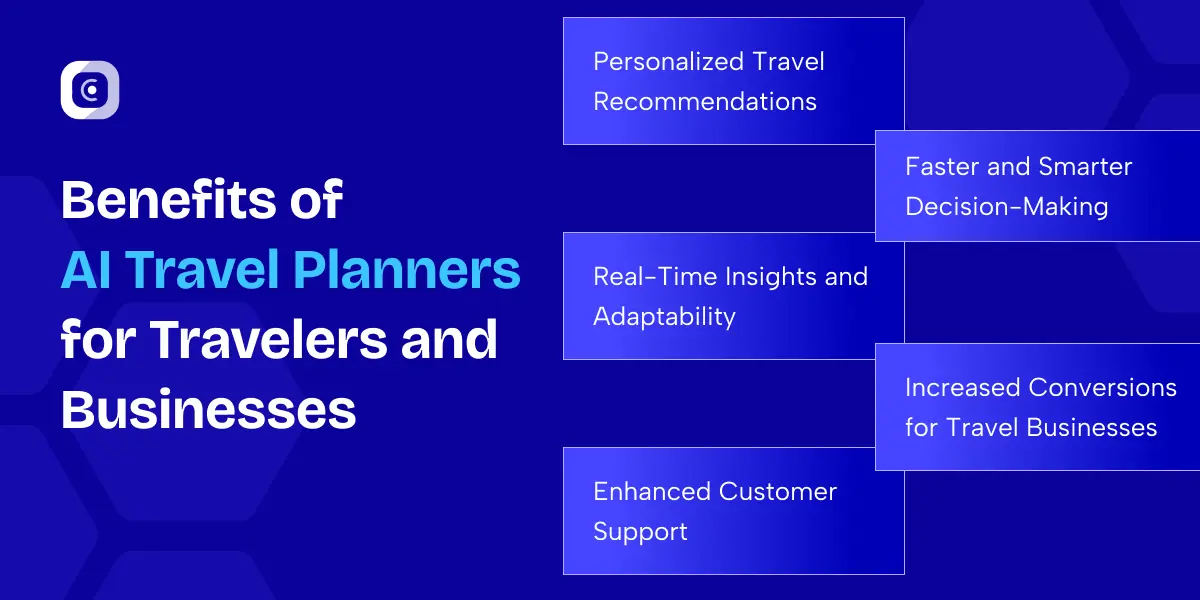
Personalized Travel Recommendations
AI travel planners leverage machine learning techniques to develop models that predict customer preferences by analyzing previous purchases and contextual variables such as budgets, climate, and seasonality. This translates to hyper-personalization across the travel spectrum.
Consider the example of a customer. If the customer typically books beach holidays in December, the AI travel assistant will suggest warm-weather coastal destinations with family-friendly accommodations.
Faster and Smarter Decision-Making
Travelers have historically dedicated a considerable amount of time to analyzing their travel options, including flights, hotel accommodations, and travel itineraries. AI-powered travel planners shorten this time significantly. Thanks to natural language search interfaces and the contextual understanding of user prompts, AI planners provide users with tailored options in mere seconds, allowing users to bypass 80% of the manual research that these planners would have otherwise conducted. One of the primary drivers for the adoption of AI travel planning tools is the rapid decision-making these tools facilitate.
Real-time Insights
AI travel assistants not only plan; they adapt. They pull in and analyze multiple streams of information in real-time from airline APIs, and reviews to make recommendations on the go.
Improved Customer Support
The use of conversational AI in travel goes beyond the search to provide round-the-clock virtual assistance for instantaneous response to inquiries. For businesses, this implies less reliance on manual support while achieving a high rate of customer support and engagement.
Improved Conversions for Travel Operators
AI Travel Planners enhance engagement and boost conversion rates for travel agencies and online travel websites. Tailored recommendations enhance relevance, while improved response times prevent users from dropping off.
As per the Skift Research’s State of Travel 2025 report, many travel companies that have implemented conversational AI are experiencing improved user engagement, conversion rates, and overall business performance due to AI-driven personalization in travel.
Real-World Examples of AI-Powered Travel Planning
AI is no longer an abstract idea. It is actively reshaping how travelers conduct searches, organize travel plans, and make bookings. Leading industry players are already incorporating AI-enabled systems into travel itineraries and conversational search systems into discovery systems to seamlessly facilitate and customize travel discovery.
Expedia’s Travel Assistant Powered by ChatGPT
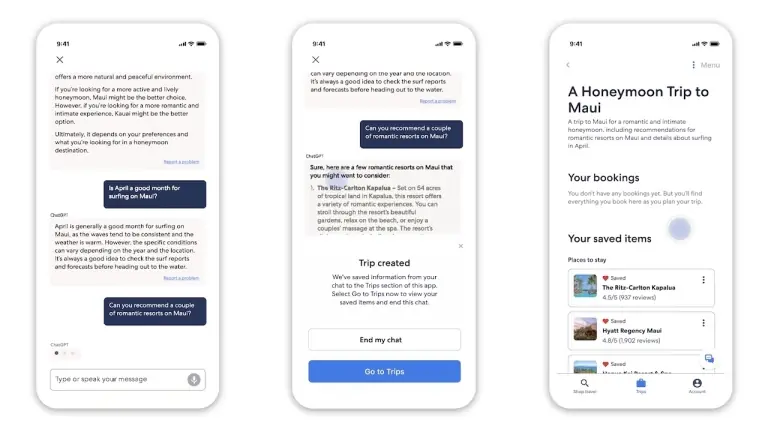
Expedia integrated a ChatGPT-enabled travel assistant into its app. It allows users to plan trips conversationally. The assistant provides customized suggestions for destinations, lodging, and activities, all within a chat, and directly syncs to real-time bookings.
Booking.com’s Trip Planner Powered by AI
Using OpenAI’s models, Booking.com has developed a Trip Planner AI. It allows users to make commands in natural language such as, “Plan a 4-day beach trip to Goa for next weekend.” The AI instantly assembles itineraries, activities, and lodging suggestions and modifies them according to user input.
Smart AI Assistant at Trip.com
By integrating real-time data with personalized searches, Trip.com’s AI Assistant analyzes user search history and travel patterns to propose flights and accommodations tailored to their destination.
The Future of AI in Travel Planning
The potential applications of AI in travel planning are promising albeit in the initial phases of development. With advancements in generative conversational AI, large language models (LLMs), and personalization methods, there will be greater seamlessness and predictability in human travel search.
The next phase in the AI travel ecosystem will be the rise of fully autonomous travel agents – multi-agents that will plan, book, and manage entire trips without user input. These agents will go beyond proposing options, coordinating travel, and executing payments to apply real-time adjustments to itineraries responsive to changes like flight delays or adverse weather.
Voice-Driven and Multi-Modal Interfaces
Voice technology will allow travelers to plan trips conversationally, i.e., “Book a weekend trip to Jaipur under ₹15,000,” and get immediate confirmations. Travelers could also use the combination of visual AI and AR/VR to preview destinations, hotels, and experiences.
Predictive and Adaptive Travel Planning
The next generation of AI will predict user-initiated queries, a novel concept in travel-planning technology. As an example, an AI travel assistant may offer suggestions tailored to a user’s historically preferred short-haul destinations for the weekend or a relaxing getaway based on a long weekend planned in the user’s calendar. This tech-spontaneity will indeed be a marvel in travel planning technology.
Hyper-Personalized Experiences
Personalization powered by AI will go far beyond simple recommendations. AI trip planners will take fully-fledged personalization to another level by understanding user preferences and analyzing social interactions and sentiments. From custom itineraries to an assortment of local adventures to choose from, there will be no end to fully personalized travel experiences. The system designers will get better and better, the more users engage.
Integration with Smart Ecosystems
Travel platforms of the future will be integrated with smart devices, wearables, and digital wallets. Envision travel notifications on your smartwatch, and as you approach the airport, your AI assistant will automatically check you in for your flight. These interconnected frameworks will ensure a seamless travel experience, eliminating any and all friction.
Responsible and Ethical AI Adoption
With AI being pivotal to the future of travel, the adoption of AI must be robust and responsible. Trust will come from the use of clear algorithms, obtaining user consent for data, and removing bias in recommendations. AI travel planners will gain the most traveler trust when innovative technology is coupled with responsible practices.
The future of AI in the travel industry will not aim to take the place of human travel experts but to enhance the human touch. To achieve great success, seamless systems must be created that mimic travel experts in thought, action, and adaptability, assisting users in transitioning from the idea stage to the realization stage of travel. While this evolution continues, it is clear that the future of travel no longer involves manual filters and useless scrolling. In the upcoming era, travel will be smart, interactive, and highly tailored facilitated by AI.
From Filters to Conversations: The New Era of AI Travel Planning
No more conventional methods of planning travel, no more mechanical, filter-based searches to determine the most fitting travel plan. AI travel planners based on LLMs give custom-made suggestions based on a traveler’s description of what they want for each segment of the trip. Gone are the times of browsing through the numerous compartments of a manual traveler planner. The user mind set has shifted in more than the technological perspective. The user frustration of conforming to the criterion based on search engines has increased the need for adaptive systems. These adaptive systems are, in fact, predominately based on the conversational AI in travel systems. These systems are designed to understand human intents, scope the relevancies of the answers, and provide user satisfaction through personalized AI travel planning systems.
For travelers, it means planning with confidence going from a thought to a full itinerary within a single conversation. For travel businesses, it means the ability to build smarter, more interconnected ecosystems that improve engagement, satisfaction, and loyalty.
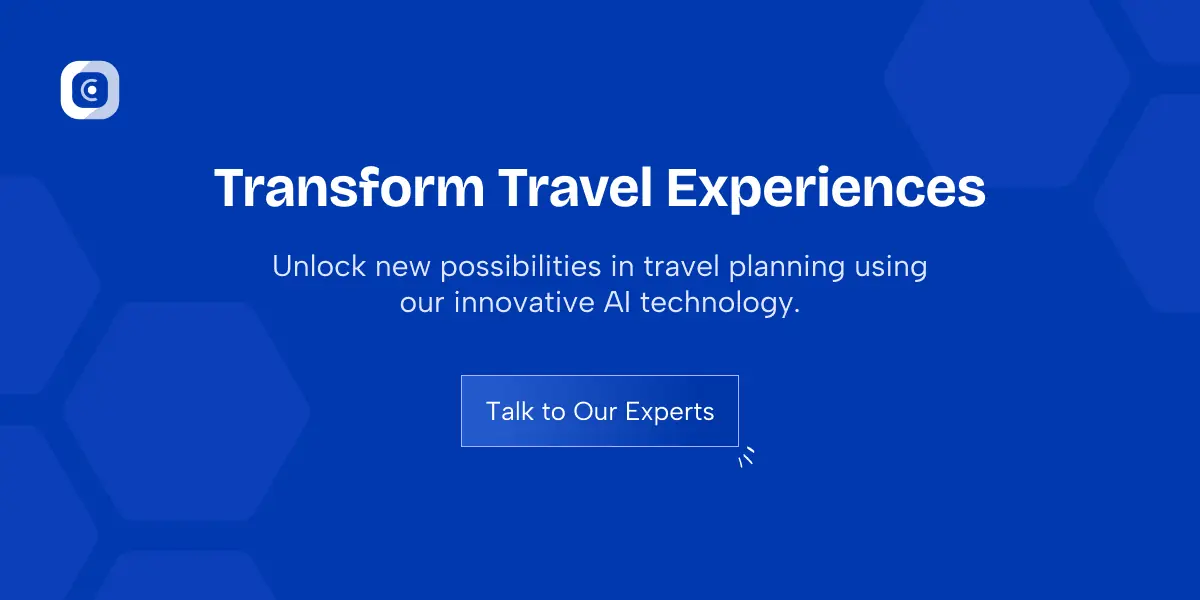
At OneClick IT Consultancy, we’re convinced the future of travel is driven by AI-powered real-time personalization transforming every journey in every search and making every interaction more intuitive and closer to a definitive purchase.
Moving forward, one thing about the travel industry is certain that the most advanced and powerful travel ecosystems of the future won’t just process countless queries; they will have to understand them, and that understanding alone will change how we experience the world.
FAQs
Conversational search enables travelers to make queries in natural language, allowing users to ask “Find me a weekend getaway near the beach under ₹50,000.” There is no need to use forms or filters. The AI perceives your intent and delivers personalized results in seconds.
An AI travel planner combines artificial intelligence, natural language processing, and large language models to assist users in trip planning. AI travel planners analyze your preferences and budget and provide personalized recommendations for flights, hotels, and itineraries.
Conversational AI trip planners analyze speech or typed commands, apply NLP and LLMs to interface with live travel APIs, and provide tailored results, eliminating the need for time-consuming manual search and filtering.
AI travel planners integrate conversational search with personalization and automation to transform hours of manual research into a streamlined, intelligent dialogue and provide customized travel solutions.
Among the best AI travel planners for natural trip searches are tools that utilize conversational AI, like OneClick’s AI-Powered Travel Planner, which provides tailored results in seconds.


